Dziady ( Polish for 'grandfathers' / 'eldfathers'), sometimes translated as Forefathers' Eve, is a term in Slavic folklore for the spirits of the ancestors and a collection of the associated pre-Christian rites.
Dziady may also refer to:
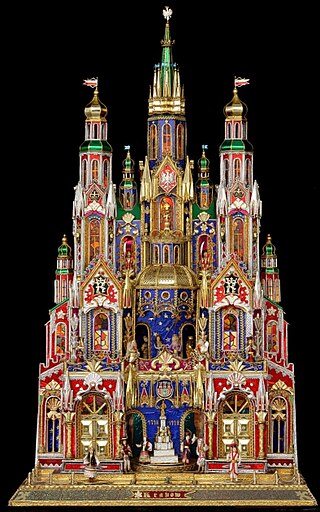
Christmas in Poland, known in the Polish language as Boże Narodzenie or Gwiazdka, is a major annual celebration, as in most countries of the Christian world. The observance of Christmas in Poland developed gradually over the centuries, beginning in ancient times; combining old Polish pagan customs with the religious practice introduced after the Christianization of Poland by the Catholic Church. Later influences include the mutual permeating of local traditions, lore, and folk culture. It is one of the most important religious holidays for Poles, who follow strict traditional customs, some of which are not found elsewhere in Europe.

Adam Bernard Mickiewicz was a Polish poet, dramatist, essayist, publicist, translator and political activist. He is regarded as national poet in Poland, Lithuania and Belarus. He also largely influenced Ukrainian literature. A principal figure in Polish Romanticism, he is one of Poland's "Three Bards" and is widely regarded as Poland's greatest poet. He is also considered one of the greatest Slavic and European poets and has been dubbed a "Slavic bard". A leading Romantic dramatist, he has been compared in Poland and Europe to Byron and Goethe.

Dziady is a term in Slavic folklore for the spirits of the ancestors and a collection of pre-Christian rites, rituals and customs that were dedicated to them. The essence of these rituals was the "communion of the living with the dead", namely, the establishment of relationships with the souls of the ancestors, periodically returning to their headquarters from the times of their lives. The aim of the ritual activities was to win the favor of the deceased, who were considered to be caretakers in the sphere of fertility. The name "dziady" was used in particular dialects mainly in Belarus, Poland, Polesia, Russia, and Ukraine, but under different other names there were very similar ritual practices, common among Slavs and Balts, and also in many European and even non-European cultures.

Dziady is a poetic drama by the Polish poet Adam Mickiewicz. It is considered one of the greatest works of both Polish and European Romanticism. To George Sand and Georg Brandes, Dziady was a supreme realization of Romantic drama theory, to be ranked with such works as Goethe's Faust and Byron's Manfred.
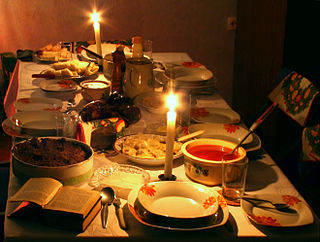
Wigilia is the traditional Christmas Eve vigil supper in Poland, held on December 24. The term is often applied to the whole of Christmas Eve, extending further to Pasterka—midnight Mass, held in Roman Catholic churches all over Poland and in Polish communities worldwide at or before midnight. The custom is sometimes referred to as "wieczerza" or "wieczerza wigilijna", in Old Polish meaning evening repast, linked to the late church service, Vespers from the Latin.
Polish Communist Party may refer to:
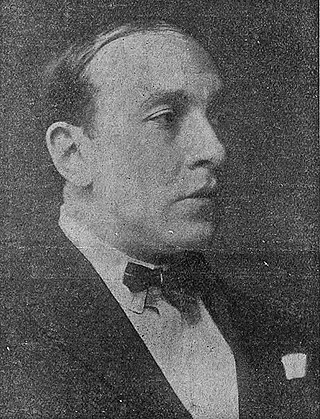
Leon Schiller or Leon Schiller de Schildenfeld was a Polish theatre and film director, as well as critic and theatre theoretician. He also wrote theatre and radio screenplays and composed music. He was born in Kraków under the Austrian rule during the foreign Partitions of Poland, to a family of Jewish and Austrian origin that had been ennobled by Empress Maria Theresa.

A twelve-dish Christmas Eve supper is traditionally prepared to commemorate Jesus' twelve disciples in Central, Northern and Eastern European cultures, especially those that were formerly part of the Polish–Lithuanian Commonwealth and neighbouring countries. The tradition is especially cultivated in modern-day Poland, where alternatively thirteen meatless dishes on Christmas Eve are sometimes served.
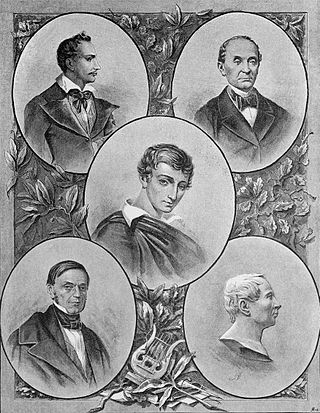
The Philomaths, or Philomath Society, was a secret student organization that existed from 1817 to 1823 at the Imperial University of Vilnius.

Kazimierz Dejmek was a Polish actor, theatre and film director, and politician. During his career he managed the New Theatre in Łódź, the National Theatre, Warsaw, and the Teatr Polski, Warsaw. From 1993 to 1996 he served as Poland's Minister of Culture. In 1984 Dejmek was awarded the Witkacy Prize - Critics' Circle Award and in 1989 the Grand Cross of the Order of Polonia Restituta, one of his country's highest honours.

Kordian is a drama written in 1833, and published in 1834, by Juliusz Słowacki, one of the "Three Bards" of Polish literature.

Christ of Europe, a messianic doctrine based in the New Testament, first became widespread among Poland and other various European nations through the activities of the Reformed Churches in the 16th to the 18th centuries. The doctrine, based in principles of brotherly esteem and regard for one another, was adopted in messianic terms by Polish Romantics, who referred to their homeland as the Christ of Europe or as the Christ of Nations crucified in the course of the foreign partitions of Poland (1772–1795). Their own unsuccessful struggle for independence from outside powers served as an expression of faith in God's plans for Poland's ultimate Rising.

Krzysztof Marek Kolberger a Polish actor and theatre director. His father's surname was changed from Kohlberger in the 1950s. He had daughter, actress Julia Kolberger, with Anna Romantowska.
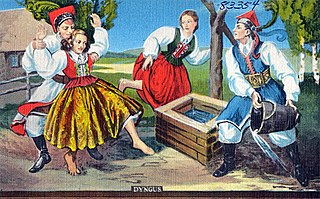
Śmigus-dyngus or lany poniedziałek is a celebration held on Easter Monday across Central Europe, and in small parts of Eastern and Southern Europe. The tradition is widely associated with Poland in English-speaking countries and is observed by Polish diaspora communities, particularly among Polish Americans who call it Dyngus Day. The tradition also exists in Hungary, called locsolkodás (sprinkling).

Lel and Polel are Polish divine twins, first mentioned by Maciej Miechowita in the 16th century where he presents them as equivalents of Castor and Pollux and the sons of the goddess Łada, the equivalent of Leda. There is no complete agreement about the authenticity of the cult of Lel and Polel.
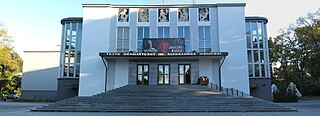
The Aleksander Węgierko Drama Theatre in Białystok is a repertory theatre in Białystok, established in 1938. It was founded by actor Aleksander Węgierko.
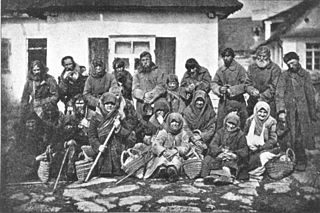
Dziady, also dziady proszalne or dziad kalwaryjski was a term commonly used in many regions of Poland to refer to nomadic beggars. Calling beggars dziady was associated with the idea that they have mediumship skills, are a kind of link with the "other world" and representatives of the dead (dziady-ancestors).
Kyi or Kvyi is an alleged Polish god or mythical figure associated with smithery mentioned only in one source, the Postil of Koźmieńczyk. So far, only Leszek Kolankiewicz has undertaken the interpretation of this figure.
One should pay attention to those who say ungodly things today in dances or elsewhere in performances, consider unclean things in their hearts, shout out and mention the names of idols, and consider whether conversion to God the Father is possible. Certainly not. For it is forbidden to hear freely these holidays, which unfortunately celebrate according to what was left of the rites of the accursed pagans of our ancestors, unless for punishment, as once the shout of the inhabitants of Sodom and Gomorrah rose. For at this festival indecent exposure and other abominations, which the Apostle says should not even be named because of God the Father. However, due to the fact that preachers have arrived, such things cease, and in many places they have already ceased [...] There is no other name under heaven in which we can be saved. For a man is not saved in the name of Lado, Jassa, !Quia, Nyia, but in the name of Jesus Christ ... Not Lada, not Jassa, not Nija, which are the names of idols worshiped here in Poland, as some chronicles of Poles testify...

Easter in Poland, a public holiday, is one of that country's major holidays, often compared in importance to Christmas. Associated with it are many specific customs and traditions.

Konrad Ksawery Swinarski was a Polish theatrical, television, film and opera director and stage designer.